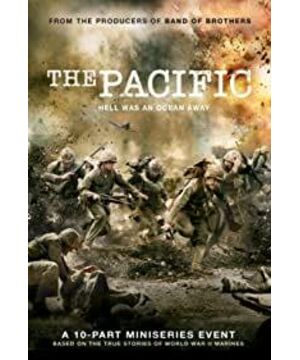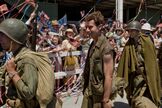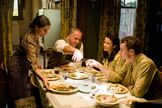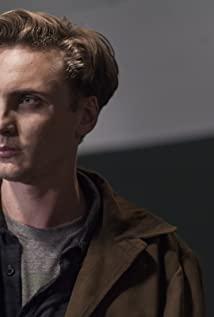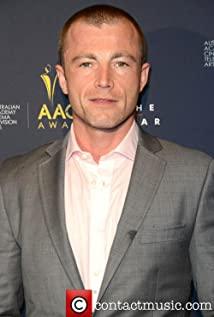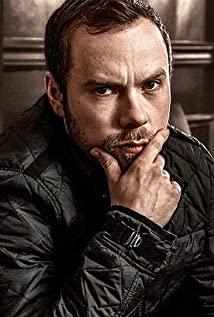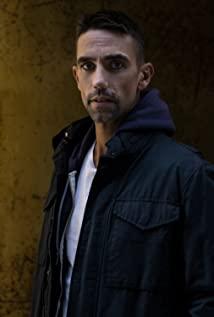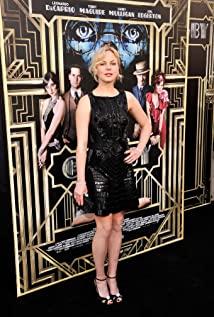·This is not a film review, this is just an over-interpretation of the characters
·Extremely subjective, if you don't agree, please click the cross, LZ does not accept any honest behavior
------- the following text -------
"Pacific" came out to the third episode, still more disappointed than applauded. As a war movie, the negative comments are not directed at historical facts, props, etc., but focus more on more "soft" factors such as the arrangement of the plot line and the shaping of characters. I don't comment on the others, because I've never been a careful enough viewer, and I don't have much obsession with narrative structure and mirror movement techniques. But for the characters, at least for John Basilone, it felt compelled to talk. I don't agree at all with this character's flat, lack of development view, on the contrary, he is the most layered character I have recently acquired - although the way these layers unfold may indeed be a bit too restrained.
·The picture of Basilone on the Hero's Back
wiki, what interests me is not the plain black and white photo, but the image on the poster - a perfect and unsurprising, masculine symbol, which is in line with people's imagination The images of the legendary Medal of Honor, Navy Cross and Purple Heart recipients fit perfectly. Only in this way, the portrayal of Basilone in "The Pacific" does not seem to be moving closer to this image, but rather a sentimental departure. Although it reproduces the hero's feats as rigorously as possible in the plot, the emotions are rendered in contrasting shades. It's weird. What's even more strange is that I am very grateful and grateful for this departure. Maybe it can't make Basilone's image bigger, at least in my own eyes, but it can make him more amiable and unforgiving. So let me keep silent and respectful to the historical John Basilone, without making any judgments, and focus on John Basilone in The Pacific.
·Part I - Part II: Honor Students and Asylum seekers
Basilone, who made her debut in the scene of the battalion commander's lecture in Part I, gave me a simple and clear first impression: top student. The solemn and focused expression, the restrained smile, and the gesture of staring at the map without joining the conversation in twos and threes after the lecture, all gave me such hints. With an extraordinary sense of honor and responsibility, generally following the rules, maybe there is some naivety and idealism left, maybe going through a process of growing up (although the family reunion scene shows that he served in the Philippines)... these The first two of the subjective guesses are not far from the facts, and the latter two are absurd. Basilone has a fairly pure nature, but that's clearly not the same thing as naivety or idealism; as for growing up, he doesn't even need it.
Under the appearance of an honor student, the side of the patron gradually surfaced from the second half of Part I to the first half of Part II. The reassuring smile on the farewell night when I shook hands with my old father, the appeasement of the irritable JP on the battlefield, the encouragement of the timid Evans... The amazing mature mentality and the eternally stable spirit displayed in the sinister environment The situation has cast a layer of "trustworthy" and "reliable" on this "top student" who is not tall and his appearance is not so mature. Of course, there is also the temperament of a leader at the same time, but in my opinion Basilone's leadership temperament is more "unconscious", and he has never put himself above others in his heart; his colleagues are also more Most of them spontaneously respect and obey because of their careful consideration and calm attitude, and there is no sense of coercion from the superior.
Basilone at this stage is almost without weaknesses, as if any situation is not enough to shake the mind. So has he really become a stereotyped "perfect man"? Not so in my opinion. The complexity of the characters does not necessarily depend on the dramatic gaps from cowardice to heroism, confusion to firmness, ideal to disillusionment, kindness to ruthlessness. Basilone, who quickly entered the state as soon as he stepped on the battlefield, also showed some subtle and moving emotions. detail. Judging from the very spicy screwed your girlfriends when he landed on Guadalcanal Island and the "adventure" of leading everyone to steal army supplies, Basilone has his own sense of humor, but compared with those rash companions around him, his Jokes and pranks are always in moderation, and never get rid of the "generally following" flavor. And looking at the complex eyes of the officer who had his neck pierced beside him and the dazed expression after the battle, it was faintly revealed that he took the life and death of his comrades very seriously, even though the environment did not allow him to indulge in this place for a long time. In these thoughts, the hidden knot in the heart is not something that can be easily put down. On the other hand, he seemed to take his own safety too lightly, or simply out of consideration. As the plot progresses, these details also become deeper and deeper.
·Part II: War Animals
In the second half of Part II, Basilone began his flamboyant performance. I still don't understand how anyone would think this episode was bland - Basilone in historical fact fought for three days and three nights in a row, so the TV series needed to shoot for three days and three nights to let the audience understand why he got the medal? ! Take a look at what he did in the night battle in the second half of Part II: machine gun fire (this is almost unnecessary); repairing guns for emergency; when gloves are lost, he uses his arms to hold hot machine guns to transfer positions to support friendly forces; The Japanese met on a narrow road, killed one person with a gun barrel, killed one or two people with a machine gun, and killed four people with a pistol. They arrived at their destination safely with two subordinates; they jumped out of the trench to clear the shooting area, and killed one enemy with a pistol; they crossed the enemy again. fetching ammunition in the jungle...especially amazing is the precision, efficiency and coherence of this series of actions, making reasonable decisions immediately without much thought, so that after he has done something, his companions don't even have time to understand him intention of. Basilone in the second half of Part II became a kind of "war animal", and for him fighting was more of an instinct than a skill. Basilone is still "unconscious" of his admirable talent as a soldier. Looking back at his "victory results" after dawn, he couldn't see any excitement or sense of accomplishment, but rather a little dazed; when he was told by Puller that he had a chance to win the medal, his reaction was also dull. Basilone didn't take the achievements in the eyes of others to heart, and all he cared about was the safety of Manny, his friend who passed by on the battlefield and then disappeared.
There are also some intriguing details in the search for Manny: the medic noticed Basilone's third-degree burns on his arm and told him to sit aside and wait for treatment, but Basilone walked out after failing to detect Manny's whereabouts, seemingly completely Forgot about his injury; after leaving the medical station, he sat silently on the side of the road and twisted the water bottle with the injured hand until JP passing by helped him. Although there may be a factor that is full of Manny and has no time to take care of him, my subjective feeling is that this person is too tough - not physically but mentally. His subconscious probably never thinks he needs care, so no matter the situation, he never actively seeks it out. Basilone finally found the dead Manny in the jungle, and after a brief but repressed expression of pain, he and JP placed Manny's body and talked calmly about life and death.
Some qualities that were only the tip of the iceberg before became clear in this part: the sense of honor for Basilone is an internal rather than an external thing, he did not want to go beyond anything, just driven by his own responsibility to complete the seemingly incredible things; Friendship has an extremely heavy weight in his mind, and it is precisely the cherishing of this feeling that he cannot show it lightly; there is no lack of concern for others, and no lack of neglect for himself.
· Manny Rodriguez, JP Morgan
Perhaps speculation, some interesting differences in the way Basilone and his two besties get along.
Manny showed a relatively meticulous and steady character in his brief appearance. Because Basilone habitually doesn't care about himself, Manny can sometimes take care of some things that Basilone didn't pay attention to. For example, Basilone realized only after Manny asked. Manny, who was left as a messenger by Puller, reminded Basilone that he was facing the situation of fighting alone before parting, and Basilone just replied "I know" nonchalantly. On the way back to get the ammunition, it was Manny who killed the two Japanese soldiers and saved Basilone's life. This is also the first time that Basilone has been helped by others. Before, he was the only one who helped others. After the scene of cleaning up the shooting circle, I can't help but think that if Manny was around, maybe he wouldn't shout "what are you doing" in surprise - the relationship between Manny and Basilone is more of a tacit understanding and tacit understanding.
While JP in the same period was relatively impulsive and bold, Basilone also acted as his pacifier and enlightener in that boring dispute over broadcasting, although JP was Sgt. like Basilone, not Evans. Emotionally unstable recruits. However, with Manny's passing, the roles of JP and Basilone are gradually reversed. If at the end of Part II, helping twist the water bottle and handing out cigarettes was only a vague prelude, Part III completely evolved into a situation where JP appeases and enlightens Basilone. I think maybe JP is the type who is usually rough and can seriously share with others when faced with common misfortune. In order to comfort others, he can put his own pain aside first, so he gradually shows his mature and tough side.
Part III: In the Shadow of Honor
Everyone in Part III did some ridiculous things. Leckie's absurdity comes with his love and breakup, Basilone's absurdity comes with his Medal of Honor. Drinking, fighting, stealing the car of the gendarmerie... The "top student" who was only doing some harmless pranks before seems to be gone. Are you inspired by the environment of Australia's singing and dancing? Basilone, who had just lost a close friend, must not have this interest. So is it the vent after losing Manny? I don't think so either, Manny's death really hit Basilone and JP a lot, but they weren't venting - having two drinks for a dead friend wouldn't be enough to vent. As for the fight, if it wasn't for the ignorant Australian soldier Poke people's scars, presumably it won't happen at all. That being the case, I can only associate Basilone's anomaly with that medal. Look at his reaction when he found out that he got MOH: from shock to astonishment to utter disorientation (during which he vomited in front of his boss once), there is not a single bit of joy. At this time, Basilone had a faint hunch that the medal would change the trajectory of his life. From then on, he was no longer a simple soldier who fought by instinct, but was given more meanings that he didn't even know he could bear. After that, his series of actions were nothing like a kind of anger, a kind of resistance to the specialization of identity that came with the medal. As he tries to escape by stealing the gendarmerie's car, JP ends the farce with a few words of exhortation: "Don't do it, not now, don't screw up your award ceremony" -- there's no particular magic in those words , Basilone complied. In fact, he has always understood what JP said. He is still the top student who can't let go of his responsibilities, and he knows that he can no longer act willfully because he has shouldered the expectations of others. It's just that JP said these words bluntly. The inescapable meaning made all his resistance seem meaningless.
At the ceremony, Basilone received the Medal of Honor with due solemnity. His glory as a soldier came to a head at this moment, and the Basilone line of Part III turned into an unmistakable tragedy. Afterwards, naturally, Basilone was told that as a hero, he would be better served by returning home and selling war bonds. Although I always doubted that he had expected this day, Basilone's reaction after he actually got the order was still moving - biting his lip, his throat seemed to be choked a little, standing in the shadows for a long time with nostalgic and confused eyes Under the golden sun, the world he really longed for but had lost.
Saying goodbye to JP at the airport was the same as when Manny was left as a messenger by Puller, Basilone told a lame joke, as if he wanted to console him, but this time he also needed reassurance. No matter how hard the two of them tried to force a smile, the eyes that were about to cry could not be hidden. Part III ends with Basilone's melancholy silhouette leaning against an airplane window, assured of his survival against his will. Of course we know this will not be the end, he will return to battle and die on Iwo Jima. Whoever seeks the last bullet will always find it somewhere.
View more about The Pacific reviews


